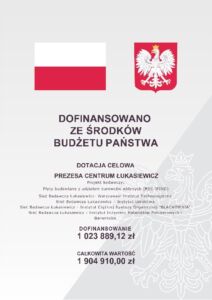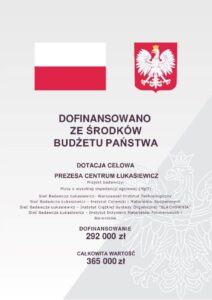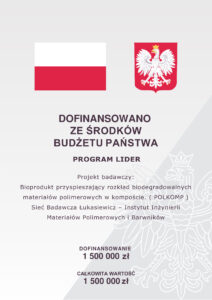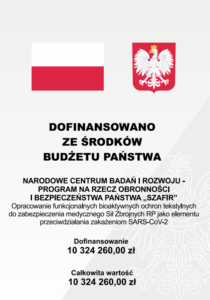Domestic projects
![]()
Project title: Testing and assessment of efficiency of the modification process of selected biodegradable polyesters using the reactive extrusion method for the purpose of improvement of their physicochemical properties.
Contest: MINIATURE 8
Financing source: National Science Centre
Total project budget: PLN 49,280.00
Cofinancing by Łukasiewicz – IMPiB : PLN 49,280.00
Implementation period: 12 months (2024/2025)
Project description:
The objective of the project is to test the effect of an addition of a cross-linked biopolyester fraction as a modifier created in an process (using the reactive extrusion method) alternative to standard reactive extrusion. The modifier created in the cross-linking process will be the same polymer as the matrix. The research will focus on learning the mechanism of formation of the composite using this modification method.

Project title: Bio-Based UV-Curable Anti-Corrosion Coatings for Metal Substrates (Acronym: BiBACoM)
Applicant: Polish Corrosion Society
Consortium:
Forschungsgesellschaft für Pigmente und Lacke e.V. (FPL), Germany
Fraunhofer Institute for Manufacturing Engineering and Automation IPA), Germany
Polish Corrosion Society (PSK), Poland
Łukasiewicz Research Network – Institute for Engineering of Polymer Materials and Dyes (Łukasiewicz – IMPiB), Poland
Road and Bridge Research Institute (IBDiM), Poland
Implementation period:
01.07.2024–30.06.2026
Project description:
The objective of the project is to enhance the possibilities of use of UV-curable coating products on metal substrates, with improvement of their adhesion and corrosion resistance. Free of organic solvents, radically UV-cured products cross-link extremely quickly, resulting in an increased production rate. The technology is energy-efficient and environmentally friendly. Well-cross-linked, tight coatings seem suitable for corrosion protection; however, they do not demonstrate sufficient adhesion to metal substrates. This is caused by shrinkage during the formation of a coating as a result of radical polymerization, which may reach between 5 and 25%. Therefore, it is necessary to use acidic adhesion promoters – which are usually compounds esterified with acrylic acid or phosphoric acid. Such acidic adhesion promoters are potential corrosion stimulants, and they also have adverse interactions with ordinary (usually basic) corrosion inhibitors, making them inefficient. A comprehensive solution to this problem would require another adhesion mechanism and/or another concept for chemical anticorrosion protection which would also work in an acid environment. There was no concept of a solution so far; therefore, the project provides for development of special adhesion promoters based on bio-materials: phytic acid and glycidyl methacrylate.
Total project budget: PLN 1,973,019.34 (including cofinancing: PLN 1,938,480.07)
Łukasiewicz – IMPiB cofinancing: PLN 933,383.67
The project is financed by the National Centre for Research and Development as a part of the Cornet Initiative.

Project title: Construction panels involving secondary raw materials
Akronym: REC-WIND
Financing source: Łukasiewicz Center
Consortium:
Leader: Łukasiewicz – IMPiB
Consortium members: Łukasiewicz – WIT
Łukasiewicz – ILOT
Łukasiewicz – ICSO
Total project budget : PLN 2 500 000
(including cofinancing: PLN 1 499 961,12 zł)
Łukasiewicz – IMPiB cofinancing: PLN 1 023 889,12
Implementation period: Februery 2023 – January 2025
Project description:
The objective of the project is to develop solutions in the form of a functional additive, composite materials and/or compound mixtures involving waste materials, to develop a production technology thereof, as well as to prepare demonstration items in the form of panels suitable for modular construction. Preliminary works will concern development of assumptions for a technology of recycling process of waste from wind farms (blades of a wind farm rotor working assembly), their acquisition, crushing, grinding and fractioning, as well as characterization of the reground materials. The product of this stage will be waste raw material to be used in the following tasks. The following works will be related to development of formulas for composites containing optimal amounts of the reground material, together with a technology for production thereof. The properties of the composites will be directed at making them into panels at the following stages which include development works in the area of production of panels from the developed composites using the method of pressing and extrusion, from the laboratory scale to the technical scale. The works will result in assumptions for a production technology of composite panels, which will be used in implementation thereof in a target company upon the conclusion of the project. The final stage of the works is mainly concerned with protection of the results of the obtained research, in the form of patent applications or know-how, as well as promotion thereof and search for customers other than the declared business partner.


Project title: Board with a high fire impedance
Akronym: MgO
Financing source: Łukasiewicz Center
Consortium:
Leader: Łukasiewicz – WIT
Consortium members
Łukasiewicz – ICIMB
Łukasiewicz – ICSO
Łukasiewicz- IMPIB
Tolal project budget: PLN 11 873 516,00
(includinf cofinancing: 9 286 083,80 zł)
Łukasiewicz – IMPiB cofinancing : PLN 292 000,00
Implementation period: March 2023 –Februery 2025
Project description:
The project is related to development of a technology for production and manufacturing of a product in the form of the first fire-resistant magnesium board based on raw materials available in the European Union. Currently, fire-resistant boards for protection of reinforced-concrete structures (e.g. tunnels), present on the European market, come generally either from a German manufacturer (PROMAT) or from Chinese ones. The PROMAT company relies on the calcium silicate technology. The Chinese companies use the magnesium carbonate technology. Chinese boards are significantly cheaper in production, compared with the PROMAT boards; however, transport costs and the recent insecurity of uninterrupted supply make the final price comparable with the prices of PROMAT goods. The designed solution responds to the strong demand for fire-resistant boards for reinforced-concrete structures, for which the European market amounts to 100 million m2 of boards (until 2030). It is necessary to ensure the continuity and reliability of supplies of the product. The project will ensure the continuity and reliability of supply of fire-resistant boards through using exclusively raw materials from the territory of the European Union and through reducing the final product price by reducing the transport costs. In view of the above, the manufactured fire-resistant board will be less expensive than the boards of Chinese manufacturers, and, above all, than the PROMAT boards. In order to offer a comprehensive product (the product itself + the mode of assembly) on the market, a glue for application of magnesium boards to protections of reinforced concrete structures (Ł-IMPiB) necessary for the final use will be developed as a part of the project. Additionally, the implementation of the project will include works on development of an emulsion for production of StopFire wood-based boards, followed by obtaining of a patent and a possibility of generation of profits for the institute from licensing/sales of property rights (Ł-ICSO).


Project title: Colour tuning of topcoat paints – a pigment selection method and ensuring of colour stability (ColourTune)
Applicant: Polish Corrosion Society
Consortium:
Łukasiewicz – Institute of Polymer Materials and Dyes, Poland
Road and Bridge Research Institute (IBDiM), Poland
Implementation period:
01.06.2022–31.05.2024
Project description:
The objective of the project is to verify whether, as a result of weathering tests of coatings under cyclically varying conditions encompassing changes of temperature, humidity and UV radiation effect, it could be determined with a high degree of probability in what manner topcoats should be modified in order to improve their weather resistance, with particular emphasis on their optical properties (preservation of gloss or colour). Results of tests of colorimetry, structure and topography of coatings, as well as of generation of tensions therein under the impact of different variable exposures, may be used to determine how long weathering tests should last and what cycle they should follow to obtain a sufficiently broad diversity of results, and thus, to obtain information necessary to direct the optimization of formulas, and also to determine which factor (UV, water, or temperature and humidity fluctuations) have the greatest effect on the decorative properties of the coatings. Therefore, the results of the project will serve both verification of laboratory research methods simulating weather conditions and determination of possibilities for improvement of topcoat properties in order to obtain the best paint stability possible. The results achieved during the implementation of the project will enable efficient selection of pigments and optimization of topcoat paints used in coating systems for long-term protection of steel structures.
Total project budget: PLN 1 987 129,29
(including confinancing: PLN 1 956 980,48 )
Łukasiewicz – IMPiB confinancing: PLN 879 804,24
The project is financed by the National Centre for Research and Development as a part of the Cornet Initiative.

Project title: Bioproduct accelerating the decomposition of biodegradable polymer materials in compost
Akronym: POL-KOMP
Implementation period:
April 2022 – March 2025
Project description:
The objective of the project is to develop an innovative bioproduct accelerating the decomposition of biodegradable materials in compost intended for soil remediation or for gardening purposes, for cultivation of selected plant species (including ones used for production of biomass for energy purposes). The bioproduct is dedicated to waste-processing companies as well as to owners of backyard composters. The use of the product will enable consumers to deposit such waste as single-use vessels, flower pots, packages, gardening films made of selected polymer materials.
Total project budget: PLN 1 500 000 zł,
(including confinancing: PLN 1 500 000 )
Łukasiewicz – IMPiB confinancing: 1 500 000 zł
The project is financed by the National Centre for Research and Development as a part of the LIDER XII Program


Project title: Development of functional bioactive textile protections for medical support of the Armed Forces of the Republic of Poland as a part of precautions against SARS-CoV-2 infections
Akronym: CoVTex
Leader:
Łukasiewicz – Łódzki Instytut Technologiczny
Consortium:
Łukasiewicz – Non-ferrous Metals Institute
Łukasiewicz – IMPIB
Silesian University of Technology
SondaSys sp z o.o.
ISKIERKA Sp. z o.o
Implementation period:
January 2022 – January 2025
Project description:
The objective of the project is to develop a customized bioactive face mask with a structure enabling quick and safe replacement of innovative functional fibrous filters, to develop single-use replaceable filters as well as reusable gloves and balaclavas, and also to assess the effect of COVID-19 on the operational readiness of the Armed Forces of the Republic of Poland. The scope of the research works includes development of fabric structures and methods of bioactive functionalization thereof, development of bioactive polymers for 3D print, design of the face mask, gloves and balaclava, development of bioactive coatings of properties [unfinished sentence].
The project is financed by the National Centre for Research and Development as a part of the programme “Development of modern, groundbreaking technologies for the state security and defence” under the code name “SZAFIR”
Total project budget: PLN 10 324 260,
(including confinancing: PLN 10 324 260 )
Łukasiewicz – IMPiB confinancing: PLN 979 000


Project title: Smart varnish coatings with a reduced heating tendencies and for flame-resistance protection of structural components for modular construction.
Akronym: ModuoTech
Leader:
Łukasiewicz – IMPIB
Consortium:
Łukasiewicz – PIT
Łukasiewicz – IMN
Implementation period: June 2021 – August 2024
Project description: The objective of the project is to develop new surface coatings – components of coating systems – characterized by an increased value of the total solar radiation coefficient and/or delaying the flammability of the materials coated therewith through flame spread limitation. The increased solar radiation reflection rate of polymer varnish coatings applied to external surfaces of modular buildings affects the increase of the energy efficiency of structures. The possibility of control of the process of sunlight-induced heat cumulation will increase the energy efficiency of buildings, reducing the cooling expenses and indirectly affecting reduction of energy losses resulting from energy network overloads.
Financing source: Łukasiewicz Center
Total project budget: PLN 1 741 028,75
(including confinancing: PLN 1 566 925,88 )
Łukasiewicz – IMPiB confinancing: PLN 1 001 025,00


Project title: Magneto-dielectric properties of hybrid organic/inorganic layers with a potential for application in removal of electromagnetic smog.
Akronym: EM_Innovation
Leader: Łukasiewicz – IMN
Consortium: Łukasiewicz – IMPIB
Implementation period:
September 2021 – September 2023
Project description:
The objective of the project covered by the application is to generate hybrid organic/inorganic layers with high absorption of electromagnetic radiation in a wide range of frequencies. In view of an international interest in this subject matter, the implementation of this project provides for development of a technology for manufacturing of innovative multi-ferrite materials in the form of particles. Due to the differences in magnetic and electric properties of individual ferrites, it is planned to obtain materials with atypical magneto-dielectric properties and a high electromagnetic radiation absorption capacity.
Financing source: Łukasiewicz Center
Total project budget: PLN 1 570 550,00
(including confinancing: PLN 1 099 385,00 )
Łukasiewicz – IMPiB confinancing: PLN 254 835,00

![]()
Project title: Novel antimicrobial protection in powder coating for composite materials (Acronym: MicroSafeCoatings)
Contest: CORNET/34/5/2022
Polish side:
Applicant: Polish Corrosion Society
Consortium:
Łukasiewicz Research Network – Institute for Engineering of Polymer Materials and Dyes (Łukasiewicz – IMPiB), Poland
Road and Bridge Research Institute (IBDiM), Poland
Rzeszów University of Technology im. I. Łukasiewicza, Poland
Łukasiewicz Research Network – Industrial Chemistry Institute, Poland
German side:
Applicant: Forschungsgesellschaft für Pigmente und Lacke e.V. (FPL), Stuttgart
Fraunhofer Institute for Manufacturing Engineering and Automation (IPA), Stuttgart
Implementation period:
01.09.2023–31.08.2025
Project description:
The objective of the project is to develop environmentally-friendly powder coatings with antimicrobial properties, intended for protection of polymer composites. Currently, such coatings usually contain silver, including in the form of nanoparticles. In spite of high antimicrobial activity, the use of silver in coating products is not an optimal solution, due to such factors as high costs of the precious metal and limited resources thereof, its immunotoxic potential and bioaccumulation. The powder coatings covered by the project will employ natural and synthetic substances with biocidal properties, including chitosan derivatives, amino acids and peptides which will additionally be immobilized on layered carriers, such as montmorillonite, hydrotalcite, and modified titanium compounds. The intercalation of the biocide will contribute to increasing its antimicrobial activity and improvement of its thermal stability, and will also facilitate dispersion of the biocidal agent in a powder coating. Controlled release of the biocide from the carrier will prolong the duration of the antimicrobial effect.
The powder coating formulas will include polyester-acrylic and polyester resins cross-linking at a temperature lower than used for conventional powder coatings, in order not to damage the structure of the composite during the curing of the coating. The capacity of such resins for polymerization according to a radical mechanism (initiated using special initiators, such as dilauroyl peroxide), will enable reduction of the cross-linking temperature down to 120–150°C in comparison with classic systems which cross-link at 170–200°C as a result of reactions of functional groups (-OH, -COOH, -NCO, epoxy). In order to improve the adhesion of the powder coating to a composite, special conductive primers will be applied to the composite surface.
The developed coatings will be assessed for biocidal activity, structure, biocidal agent dispersion degree, mechanical and resistance properties, including resistance to UV radiation and water absorption.
The obtained results will enable selection of a promising concept for production of powder coatings cured at temperatures lower than conventional, characterized by good biocidal and protective properties, which might serve as an ecological alternative to solvent-based antimicrobial paints containing silver.
Total project budget: PLN 1 720 399,92
(including cofinancing: PLN 1 688 290,27 )
Łukasiewicz – IMPiB confinancing : PLN 251 240,60